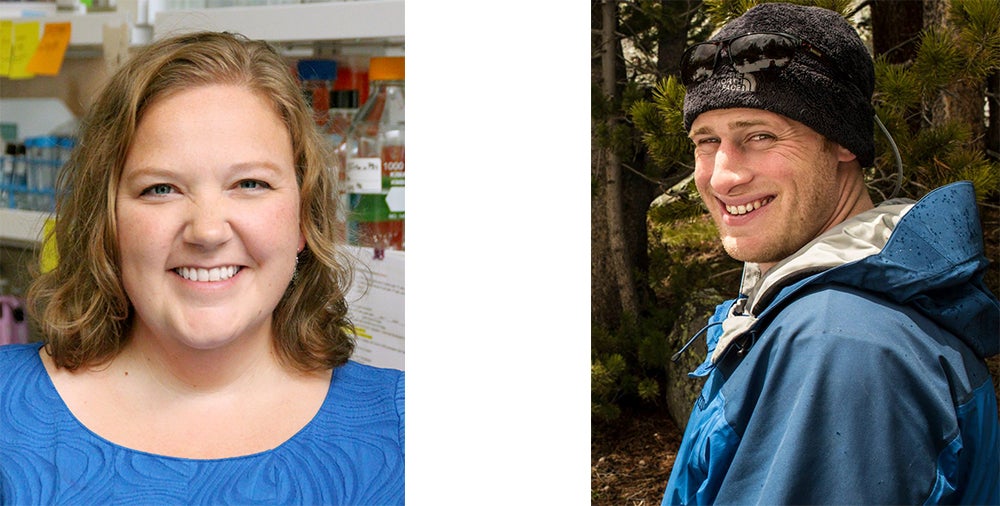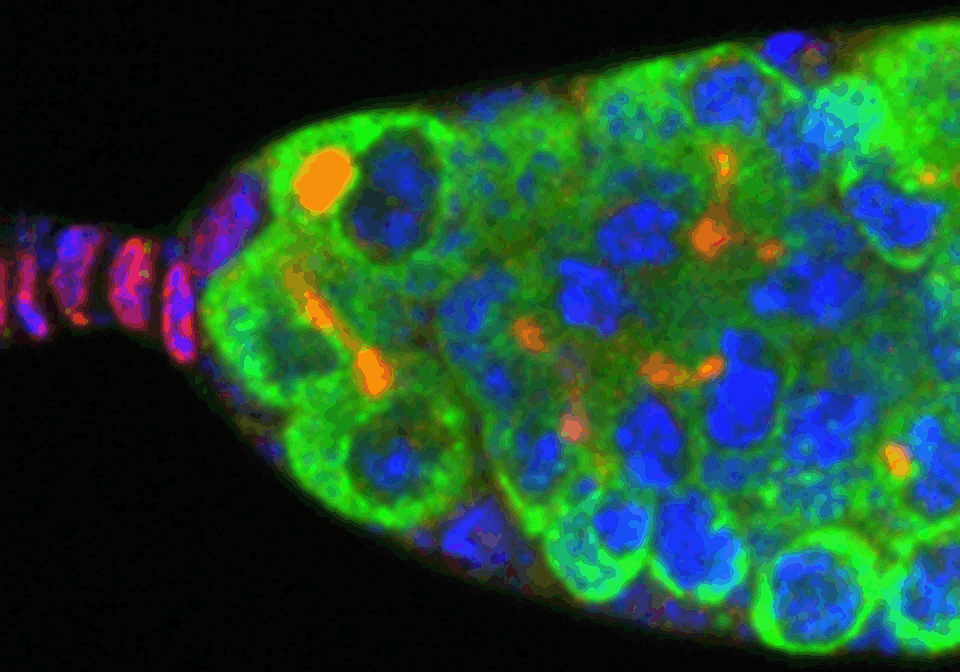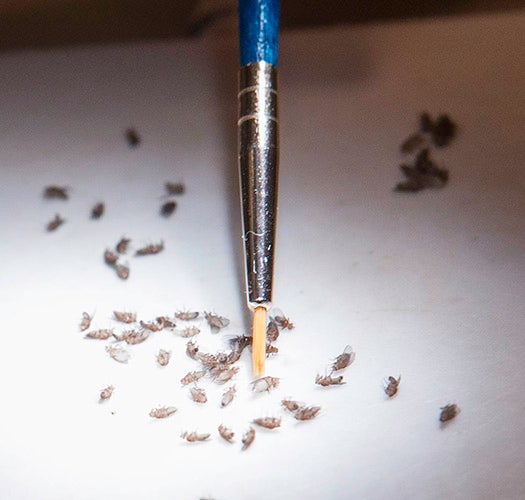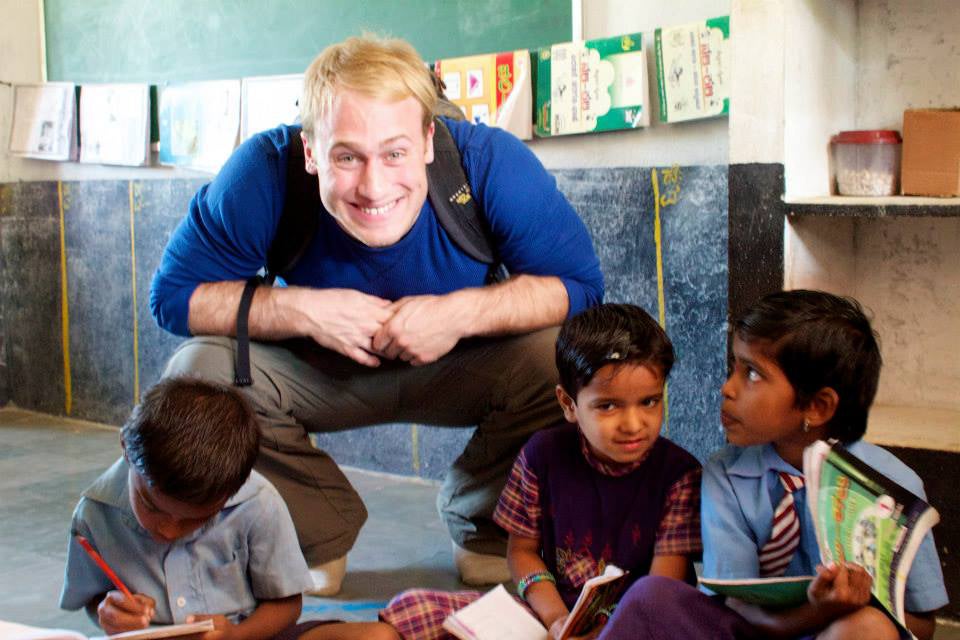Harriot College announces 2018 Dean’s Early Career Award recipients
East Carolina University’s Thomas Harriot College of Arts and Sciences has announced that Dr. Elizabeth Ables, assistant professor of biology, and Dr. Jacob Hochard, assistant professor of economics, are recipients of the 2018 Dean’s Early Career Award. The announcement was made May 10 during a special reception hosted by Dean William M. Downs at the home of the THCAS Dean’s Advancement Council Chair Jim Mullen and his wife Pam.
The Dean’s Early Career Award, established in 2015 through the generosity of the Harriot College Advancement Council, recognizes and rewards exceptional performance by tenure-track assistant professors. It represents the college’s breadth of faculty excellence in the humanities, social sciences, natural sciences and mathematics.
“The award’s primary focus is on the faculty member’s productivity in research and creative discovery, which must be judged to be of such high quality and impact that it exceeds expectations,” said Downs. “Outstanding performance in professional development must be complemented by demonstrated excellence in instructional effectiveness and service, and I am extremely pleased to say Drs. Ables and Hochard exceeded these qualifications.”
In addition to their recognition at the home of the Mullens, Ables and Hochard will be acknowledged at Harriot College’s fall convocation in August.

Dr. Elizabeth Ables, assistant professor of biology, and Dr. Jacob Hochard, assistant professor of economics, are recipients of the 2018 THCAS Dean’s Early Career Award. (Contributed Photos)
Dr. Elizabeth Ables
“I am humbled and surprised,” said Ables. “This award has gone to some folks that I really admire in the field, especially in our department. It’s nice to consider myself part of that rank.”
Born and raised in rural Virginia, Ables has a lot in common with a majority of the students at ECU.
“It means a lot to me personally to have been able to come to this part of the country,” Ables said. “One of the things I decided I wanted to do when I started this path was to provide experiences for students from rural areas, and I feel East Carolina University has given me the opportunity to do that.”
Ables received her doctoral degree from Vanderbilt University in 2007 and completed post-doctoral training at Johns Hopkins University in 2012, before coming to ECU in January 2013. She is a cell biologist and geneticist, and she teaches undergraduate and graduate-level courses in cell biology.
“I teach very differently to the undergraduates than I do to the graduate students,” Ables said. “I enjoy the undergraduates. They tend to be more enthusiastic when they learn something for the first time. But I like challenging the graduate students, in part, because they challenge me back. I think my most rewarding experience is teaching the graduate students who work in my lab.”

Ables studies the Drosophila melanogaster (fruit fly) stem cells seen here. They are located in the ovary and are the parent cells for every oocyte, or egg, produced by the female fly. (Contributed photo)
As a cell biologist and trained developmental biologist, Ables researches how cells that make up the human body are instructed by genomes to have a specialized function. She uses stem cells as a model because they have the potential to divide and make new daughter cells. This research underlies two fundamental biological questions pertaining to regenerative medicine, and how we make new cells from stem cells or other tissue sources; and cancer biology, which is a problem of unlimited cell division.
Currently, two doctoral students, three master’s students and up to four undergraduate students per semester conduct research in Ables’ lab using Drosophila melanogaster, the common fruit fly.

Fruit flies are being sorted by a student researcher in Ables’ lab. In the lab, Ables and her students study the basic biology of how cells use the information encoded in the genome to establish specialized functions. (Photo by Cliff Hollis)
“It’s a great model system. I use it as a way to teach cell biology in my classroom,” said Ables. “It’s really hard to get attached to a fly, which I think is good for beginning experimentalists, and we have a lot of tools so the experiments we do are relatively simple.”
At ECU, Ables collaborates across campus with researchers in the reproductive biology interest group. She is involved with a variety of microscopy groups including the Laser Technology Applications Group, an east/west campus initiative that seeks to provide more dynamic research and information-sharing opportunities to industry and academic researchers. Also, Ables serves or has served on the biology departmental undergraduate curriculum committee, the biology graduate curriculum committee and on a number of faculty searches.
Dr. Jacob Hochard
When Hochard learned he would be one of the recipients of this year’s award, he said, “It’s definitely humbling. I know a lot of the past recipients, and they are great scholars. I am privileged to be in their company.”
“ECU has done a really good job of supporting early career researchers,” Hochard said. “I think they are progressive at institutionalizing interdisciplinary research, which is one of the reasons I am very happy here.”
Hochard received his doctoral degree from the University of Wyoming in 2015, before beginning his career at ECU that same year. At ECU, Hochard is an assistant professor of economics and an assistant research scientist at the Institute for Coastal Science and Policy. He teaches an introductory-level principals of microeconomics course, and he teaches doctoral students in the coastal resources management program.
“I love teaching the introductory level students,” said Hochard. “Most of them are first-generation college students, and I am too. So I think I can identify with them and get them excited about economics.”

Through one of his research projects, Hochard traveled to rural Karnataka, India, where he visited schools and interviewed farmers about their agricultural practices and challenges. (Contributed photo)
Hochard’s research focuses on ecosystem services from land, water and wildlife. He is examining the red wolf recovery program in eastern North Carolina, how land use changes in the developing world affect poverty rates and the human health impacts of hog farms on eastern North Carolina, specifically how ingesting contaminated water affects birth weights and gestation lengths.
His most pressing work is the focus on water quality in eastern North Carolina, which is funded by the Environmental Protection Agency. ECU co-collaborators include Dr. James Randall Etheridge, assistant professor of engineering, and Dr. Ariane Peralta, assistant professor of biology.
“We are hoping to inform communities on how they can protect themselves against potentially contaminated water sources, whether that’s expanding public services into rural areas that currently lack them, or investing in natural capital – forest cover, restoring buffers that will filter out contaminants – and how that might protect human health,” said Hochard. “The thing I find intriguing about the work we are doing in water quality and human health is it is one of those areas where you can have a local impact and still make a broad intellectual contribution that is recognized by our peers.”
Beyond his research at ECU, Hochard is a member of the Coastal Maritime Council. Earlier this year, he received the 2018 Coastal-Maritime Council Coastal Scholar Award during ECU’s Research and Creative Activity Week. He is a member of the Coastal Resource Management doctoral program admissions committee, a member of the Science and Technology Advisory Committee for the Albemarle-Pamlico National Estuarine Partnership, and he founded and organized ECU’s Early Career Contributions in Climate and Coastal Science seminar series.
-by Lacey L. Gray, University Communications